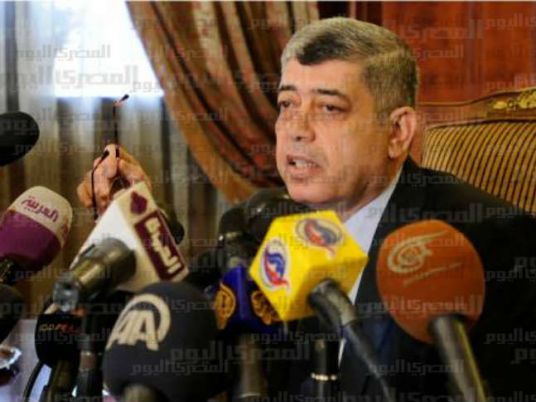
After nearly two years and two months of terrorist attacks and scandals, the Interior Ministry has struggled to counter threats facing the nation. On Thursday, Prime Minister Ibrahim Mehleb made a limited cabinet reshuffle of eight ministers, including Interior Minister Mohamed Ibrahim, who was replaced by the General Magdy Abdel Ghaffar.
After serving two completely different regimes, Ibrahim withstood criticism for what critics say was security negligence of frequent terrorist attacks witnessed by the country after the 30 June 2013 uprising, as well as for the brutal security practices used against citizens.
Six incidents stood out during Minister Ibrahim's tenure that arguably led to his dismissal; most recently the killing of political activist Shaimaa al-Sabbagh, the Air Defense Stadium massacre and bombing the High Court complex.
The prison transport van

In August 2013, 36 prisoners, mostly members of the Muslim Brotherhood, were killed outside the Abu Zaabal prison, suffocated with gas after having been detained inside a prison transport van for six hours.
The Interior Ministry said at the time that the prisoners held an officer captive and fought in an attempt to escape, but the police forces managed to free the officer and take control of the situation with tear gas canisters, which led to the death of the prisoners as they stampeded to exit the van.
The incident provoked anger among youth movements that demanded the dismissal of the interior minister and a fair investigation.
On 22 October 2013, Prosecutor General Hisham Barakat referred four officers of the Heliopolis Police Station to trial on charges of manslaughter as a result of recklessness, lack of prudence and serious breach of job responsibility.
On 29 October, the trial of the four officers began and the verdict was issued on 18 March 2014, sentencing the deputy sheriff of the Heliopolis Police Station to 10 years in prison and the other three officers to a suspended one-year imprisonment sentence. Yet the court rescinded the verdict and returned the case to the prosecutor general for further investigations. They were then acquitted.
In January 2015, the Court of Cassation accepted the appeal submitted by the public prosecutor and ordered a retrial for the accused.
National Security Officer Mohamed Mabrouk assassinated

Two month passed and on 17 November 2013, National Security Officer Mohamed Mabrouk was shot dead by unknown assailants on his way to work in Nasr City, according to a statement issued by the Interior Ministry.
Mabrouk was investigating the espionage case in which deposed President Mohamed Morsy and a number of Muslim Brotherhood leaders are accused. He also contributed to the arrest of the Nasr City terrorist cell.
The bombing of the Daqahlia Security Directorate
.jpg)
On 24 December 2013, at least 14 policemen were killed and 130 others wounded by a car bomb that blasted the Daqahliya Security Directorate.
Security sources said the suicide bomber was an informant from National Security. His name was Imam Mahfouz, born in 1973 in Cairo. He lived on Youssef Awad Street in Matareya. And he was arrested twice before.
The sources added that instructions from senior National Security leaders were given to the officers to release him on the grounds that he would work as an informant for the bureau.
Al-Masry Al-Youm has posted a YouTube video of the attack.
Activist Shaima al-Sabbagh's killing

Nn the eve of the fourth anniversary of the 25 January revolt, The 32-year old Political activist Shaima al-Sabbagh and the member of the Socialist Popular Alliance Party (SPA) was shot dead during a march with floweres near Tahrir Square.
The SPA held the security forces the responsiblity for the young activist killing and wrote on Facebook that she was shot with a police cartridge rifle while she was placing roses at the Tahrir Square memorial during a peaceful march.
Meanwhile, The democratic current including AlDostor, AlKaramah the social popular alliance, Misr AlHoreya and justice parties declared they will not participate in the coming parliamentary elections unless the government responds to their demands including the dismissal of minister of interior Ibrahim, after video footages where a policeman appeared shooting the young killed protester.
Al-Masry Al-Youm has posted a YouTube video documenting her death.
Air Defense Stadium catastrophe

A very short time passed before the situation exacerbated when the Air Defense Stadium massacre took place, killing at least 22 of the Zamalek Football Club’s White Knights Ultras, after they were prevented from attending the match because they did not have tickets. The massacre sparked a wave of outcry from various political parties and coallitions who demanding Sisi dismiss Ibrahim.
A video clip on Facebook showed the fans stranded in an iron cage and shouting: “We are dying. The other fans demanded the police force to let them out, but minutes later the iron cage collapsed and the force fired tear gas canisters, cartridges and bullets, killing 19 people.
The Egypt Revolution Party (Masr Althoura) blamed the head of Zamalek Club, Mortada Mansour, along the football association and the Interior Ministry for the massacre, while the Karama Party condemned the unjustified violence against the fans, demanding Ibrahim’s dismissal.
Following the masacre, the Dostour party along with the Egyptian Social Democratic, Egypt Freedom, and Life and Freedom parties issued a joint statement, also demanding the dismissal of Ibrahim and the ministry's restructure.
Al-Masry Al-Youm has posted a YouTube video of the aftermath of the incident.
Bombing of the High Court Complex

The most recent terrorist attack was the bombing of the High Court Complex on Monday in broad daylight and amid intense security presence, killing at least one person and wounding nine others, including four conscripts, as well as destroying six cars.
Al-Masry Al-Youm has posted a YouTube video of the aftermath of the incident.
